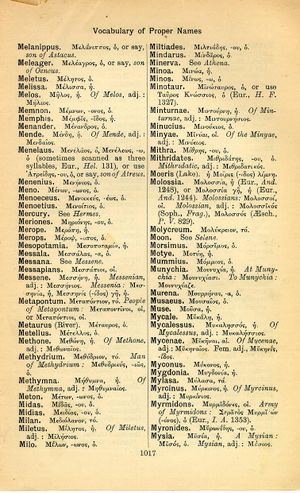Mesopotamia
ἔνδον γὰρ ἁνὴρ ἄρτι τυγχάνει, κάρα στάζων ἱδρῶτι καὶ χέρας ξιφοκτόνους → yes, the man is now inside, his face and hands that have slaughtered with the sword dripping with sweat
English > Greek (Woodhouse)
Μεσοποταμία, ἡ.
Latin > English (Lewis & Short)
Mĕsŏpŏtămĭa: ae, f., = Μεσοποταμία,
I a country of Asia, between the Euphrates and Tigris, now called Al-Jezireh, Cic. N. D. 2, 52, 130; Isid. 13, 21, 10; Mel. 1, 11, 1; Plin. 5, 12, 13, § 66; Sall. H. 4, 51 Dietsch. —Hence, Mĕsŏpŏtămĭus, a, um, adj. (also written Mĕsŏpŏtămēnus), Mesopotamian (post-class.): milites, Val. ap. Vop. Aur. 11: Mesopotameni homines, Sall. H. 4, 53 Dietsch.—In plur. subst.: Mĕsŏpŏ-tămēsii, ōrum, m., the Mesopotamians, Spart. Hadr. 21, 12; Schol. Juv. 1, 104.‡ † mesŏpylus, a, um, adj., = μέσοσπύλη, that is at the middle door, Inscr. Grut. 32, 11.
Latin > French (Gaffiot 2016)
Mĕsŏpŏtămĭa,¹² æ, f. (Μεσοποταμία), Mésopotamie [contrée de l’Asie entre le Tigre et l’Euphrate] : Cic. Nat. 2, 130 ; Plin. 5, 66 || -mēnus, et mĭus, a, um, de Mésopotamie : Val d. Vop. Aur. 11 || -mēnī, m., les habitants de la Mésopotamie : Spart. Hadr. 21, 12.
Latin > German (Georges)
Mesopotamia, ae, f. (Μεσοποταμία), eine Landschaft Asiens zwischen dem Euphrat u. Tigris, Cic. de nat. deor. 2, 130. Mela 1, 11, 1 (1. § 62). Treb. Poll. Gallien. 12, 1. Ruf. Fest. 23. Vulg. gen. 24, 10. Hieron. de interpr. nom. Hebr. tom. 3. p. 202 Vall. (p. 939 Migne). Isid. orig. 13, 21, 10. – Dav. Mesopotamēnus, a, um, in od. aus Mesopotamien, mesopotamisch, auxiliares, Valer. imp. bei Vopisc.: episcopus, Cassiod. – Plur. subst., Mesopotamēnī, ōrum, m., die Einwohner von Mesopotamien, die Mesopotamener, Spart. Hadr. 21, 12. Vopisc. Aurel. 11, 3. Schol. Iuven. 1, 104.

